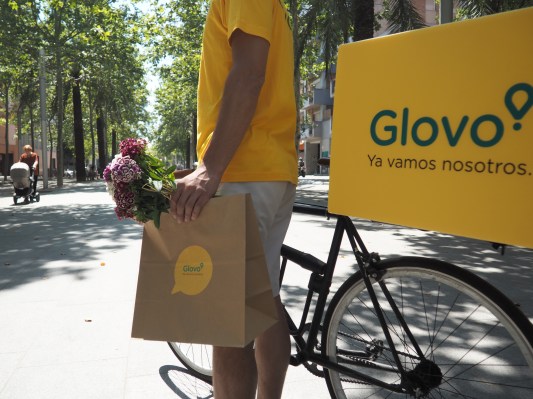
Spain’s on-demand delivery app, Glovo, is gearing up to be able to deliver a much wider range of products within a 30-minute timeframe by rolling out a b2b logistics play — drawing on a network of city centre warehouses that it plans to massively expand over the next twelve months.
It’s just announced the launch of a new business unit, called Q-Commerce — the ‘Q’ standing for quick — to accelerate development of a b2b service that will see it offer to stock third parties’ products in its warehouses and have the couriers that operate on its on-demand platform make deliveries for other businesses too — offering what it bills as a “turn-key” logistics solution for businesses of all sizes to underpin their own online stories.
It is already working with retail brands like Unilever, Nestle and L’Oreal and supermarkets including Walmart, Carrefour and Kaufland to stock and sell their goods from its network of so-called ‘dark stores’ — which are currently located in Barcelona, Madrid, Lisbon and Milan — offering users there speedy delivery for selected groceries and other items under its ‘Glovo Market’ brand (currently with the carrot of free 24-hour delivery and no minimum spend). But it’s aiming to ramp up across the board — expanding the reach of its Glovo Market offer to more cities and launching a b2b offer to power others’ online stores — saying it plans to have more than 100 dark stores up and running by the end of 2021.
Commenting in a statement, Daniel Alonso, global director of Q-Commerce at Glovo — and former ecommerce director at Walmart — said: “With shops closing down and lockdowns globally, consumers now want and expect more items than ever to be delivered to their doorstep. With this has brought new demands — it is no longer a case of waiting 24-48 hours for a delivery. Rather, the expectation for this is now a matter of minutes. At Glovo we’re committed to thirty minutes or less with all products available on Q-Commerce. As we continue to expand our enhanced offering, we’re excited to launch Q-Commerce in other parts of Spain and the rest of Europe, Eastern Europe and Africa over the next 12 months.”
Glovo says it wants Q-Commerce to power delivery of a wide range of products — not just meals and food from restaurants and supermarkets but anything sold in toy, music, book, flower, beauty and pharmacy stores.
There are some obvious gaps in that list: Clothes and shoe stores, for example, which are more likely to have their own online shopping infrastructure already. Plus clothes shopping is also more complex — given the propensity for returns when items don’t fit or suit. But it looks like Glovo is going after almost everything else.
It says its Glovo Market service has more than 50,000 active users, at this point — touting the delivery of around two orders every minute. It also says it’s delivered more than 12 million “multi-category” orders globally to date, while in Spain the number of orders for grocery items doubled this year to more than 1 million. Its overall growth rate in 2019 was more than 300% year-on-year, it added.
The Deliveroo and Uber Eats rival has always touted itself as a ‘deliver everything’ app because it offers the option for users to request anything (within bike-able reason) be brought to your door by one of its gigging couriers, even though the majority of the business involves biking fast food around cities.
Meal deliveries were making up three-quarters of its revenues at the start of this year — but Glovo has ambitions to beat Amazon at the urban convenience game of delivering all sorts of stuff really, really fast. And it’s got investors on board with the plan. Last year it raised a $169M Series D and a $166M Series E in quick succession.
It’s further beefed up its balance sheet this (pandemic) year by offloading its LatAm ops — selling them to European rival Delivery Hero for $272M — which means it’s concentrating its market focus on Southern and Eastern Europe (it also has a small footprint in sub-Saharan Africa, in Kenya and Ivory Coast).
Presumably it sees that footprint as a better fit for the ‘get stuff now’ convenience push it’s making with Q-Commerce combined with a network of its own city center warehouses (aka dark stores). Though last year it also said it wanted to work on building a path toward profitability over the next year+ so fierce competition in LatAm may have pushed those markets out of reach.
Glovo says it has more than 9 million monthly active users, at this point — and 55,000 “associated partners” globally; aka the gig workers who do the heavy lifting of making actual deliveries for its platform.
The startup is facing ongoing legal uncertainty in its home market over its classification of ‘glovers’ (as it calls couriers) as ‘self-employed’. Spain’s supreme court recently found a rider to be in a laboural relationship with the platform — and any move to force the business to reclassify the thousands of couriers it relies upon in the country would radically rework its push for profitability, to put it mildly.



